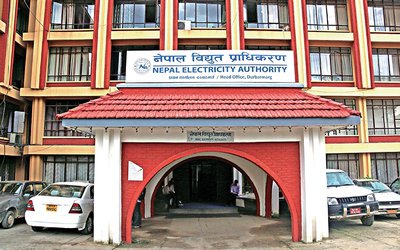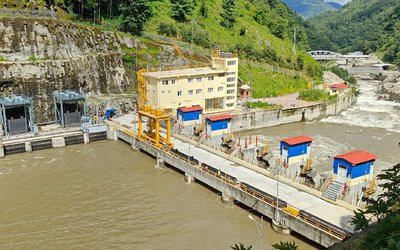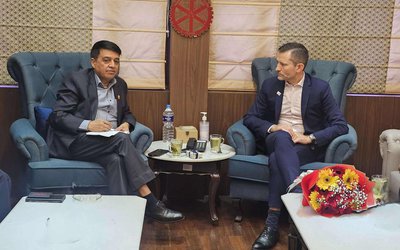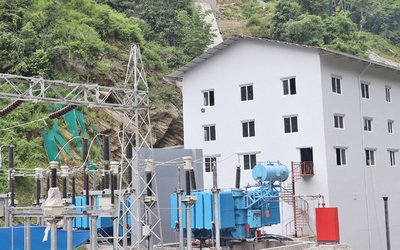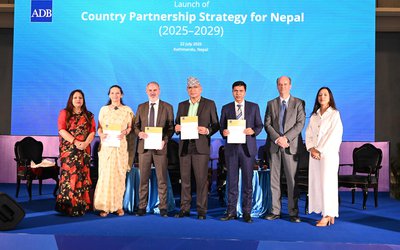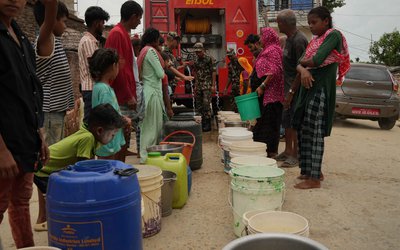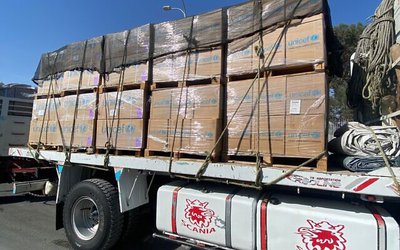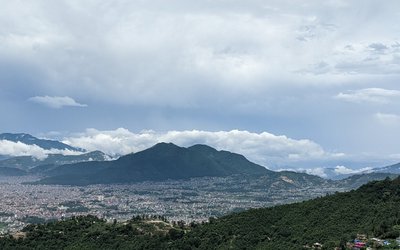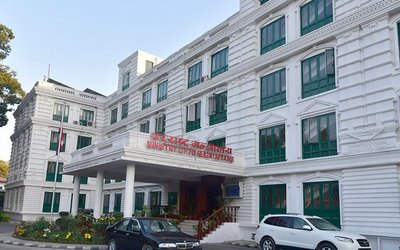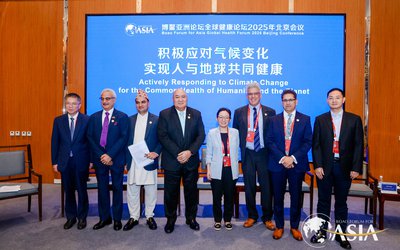

As Nepal continues its journey towards sustainable development, the Deutsche Gesellschaft für Internationale Zusammenarbeit (GIZ) has been a consistently impactful international development agency.
Over the past 50 years, GIZ's partnership with Nepal has become a leading example of long-term technical cooperation in the renewable energy sector.
GIZ (Formerly GTZ) Support: A Legacy of Development
GIZ, formerly known as GTZ (Deutsche Gesellschaft für Technische Zusammenarbeit), has been a crucial development partner for Nepal for five decades. Since establishing its presence in Nepal, GIZ has played a significant role in the country's socio-economic development across various sectors.
One of GIZ's early and noteworthy contributions was the Bhaktapur Development Project, which focused on preserving Nepal's cultural heritage. This project not only restored historical monuments but also enhanced local livelihoods by promoting tourism and improving urban infrastructure.
In the field of infrastructure, GIZ introduced the Green Roads concept to promote environmentally sustainable road construction, especially in rural and hilly areas. In agriculture, GIZ supported the modernization of farming practices and provided capacity building for farmers, leading to increased productivity and food security.
GIZ has been a longstanding partner in environmental protection and biodiversity conservation, particularly in the Hindukush Himalayan region through collaboration with ICIMOD. Their efforts have helped preserve delicate ecosystems and enhance climate resilience. In local governance and urban development, GIZ has focused on strengthening institutions and facilitating participatory planning processes to improve service delivery and urban infrastructure.
Furthermore, GIZ has played a role in enhancing public health, supporting the Peace Process, managing solid waste, providing clean drinking water, aiding in earthquake recovery efforts post the major earthquake, and expanding access to technical and vocational education to cultivate a skilled workforce in Nepal.
GIZ's involvement in renewable energy development has been a key focus of its long-term commitment. By offering technical assistance and policy guidance, GIZ collaborated with the Government of Nepal to establish the Alternative Energy Promotion Center (AEPC), which has played a crucial role in expanding access to clean and sustainable energy solutions in rural Nepal.
For the past fifty years, GIZ has provided diverse and consistent support that has had a lasting impact on Nepal's development journey. Whether it be in heritage preservation, energy access, or governance reform, GIZ has been a reliable partner in helping to create a more sustainable and resilient Nepal.
GIZ In Renewable Energy
From introducing micro-hydro electrification in remote villages to advising on national energy strategies, GIZ has not only facilitated energy access but has also influenced the frameworks that will shape Nepal's energy future. Its contributions have gone beyond traditional aid, focusing on transformative system-level changes, capacity building, and policy reform—essential elements for building a resilient green economy.
Nawaraj Dhakal, Executive Director of AEPC, highlighted the significant impact of GIZ's technical support in the renewable energy sector, stating, "GIZ has provided immense support to AEPC, benefiting the rural population through various projects. GIZ's assistance has been crucial in promoting and developing renewable energy in Nepal."
From Access to Empowerment
Initially, GIZ focused on expanding rural electrification through small-scale renewable technologies like micro-hydropower and improved cook stoves. The *Small Hydropower Promotion Project (2000–2009)* was a key initiative that laid the groundwork for decentralized energy production. By facilitating the establishment of the Small Hydropower Developers Association – Nepal (SHDAN) and enabling the operation of over 100 small hydro plants, GIZ contributed to electrifying numerous households in off-grid areas.
As time passed, GIZ shifted its approach from infrastructure development to institutional strengthening. The agency played a crucial role in shaping the Rural Energy Policy, a significant document that guided national electrification efforts during the 2000s. This transition from focusing on hardware to governance marked a pivotal moment in Nepal's energy transformation.
Establishing Energy Efficiency and Strategic Planning
GIZ's support for strategic energy planning has had a lasting impact. Through the Nepal Energy Efficiency Programme (NEEP I & II) from 2010 to 2021, GIZ facilitated the creation of the Biomass Energy Strategy (BEST) and the Energy Efficiency Strategy (EEST)—foundational documents in Nepal's energy policy framework.
Importantly, GIZ went beyond mere planning and implemented these strategies by training over 1,000 energy efficiency leaders, assisting 100 municipalities in developing comprehensive energy development plans, and helping industries save more than 220,000 MWh of energy annually through energy audits.
This approach exemplifies GIZ's holistic model: merging policy with practical implementation to ensure that reforms benefit all stakeholders, from government ministries to local municipalities.
The ENDEV Model
Since its inception in 2009, the Energizing Development Nepal (ENDEV) initiative has emerged as a prominent success story in development cooperation. ENDEV has facilitated the connection of over 350,000 individuals to electricity, benefiting 4,200 businesses and 1,700 public institutions such as schools and health posts, enabling them to operate more efficiently.
Significantly, ENDEV tackled energy poverty not only through electricity access but also by promoting clean cooking technologies. The distribution of electric cooktops and improved cook stoves to more than 160,000 individuals showcased how access to energy, combined with behavioral change and gender sensitivity, can uplift rural women and enhance health outcomes.
Renewable Energy for Climate Action
GIZ's evolving initiatives in Nepal have increasingly aligned with global climate objectives. Programs like REEEP-GREEN and RERA exemplify this shift, emphasizing not only energy supply but also emission reduction, low-carbon technologies, and climate-resilient planning.
The REEEP-GREEN program, launched in 2021 with co-funding from the EU and Germany, serves as a cornerstone of this climate-centric approach. In just one year (2022), it facilitated energy savings of over 165,000 MWh and a reduction of 36,870 tons of CO2 equivalents in Nepal. Furthermore, it fostered local ownership by empowering 100 municipalities to formulate Renewable Energy Policies and Sub-Committees, bringing climate action to the grassroots level.
Similarly, RERA (2016–2022) encouraged 16 rural municipalities to integrate IT-based energy planning and allocated NPR 1 billion for renewable energy, demonstrating the effectiveness of data-driven local governance.
Nepal’s Green Transport Ambitions

Caption: Electric Micro Bus: Clean and Green Transport (Photo Courtesy GIZ)
GIZ is also making strides in the transport sector. The Sustainable Electric Transport for Nepal (SET4NPL) initiative (2023–2028) aims to deploy 3,500 electric micro and mini-buses, providing a practical solution for cleaner public transportation. By assisting the Government in meeting its Second Nationally Determined Contributions (NDCs), this initiative demonstrates how GIZ is aligning local development objectives with global climate commitments.
A Model of Long-Term Development Partnership
GIZ’s fifty-year partnership in Nepal showcases the importance of consistency, trust, and adaptability in development cooperation. Initially focused on rural electrification, this partnership has evolved into a platform for policy reform, technological innovation, and climate resilience.
In contrast to short-term projects, GIZ’s work in Nepal highlights that sustainable development is a gradual process, built on local capacity, national vision, and international cooperation. As Nepal addresses energy security and climate change challenges, GIZ continues to be a partner and a driver of transformation.

Charging station:EVs Bringing Change

Induction cook stoves in Use
- NEA's Claim: It’s Not Load Shedding in Chitwan, But a Technical Issue
- Jul 28, 2025
- Nepal Army Distributed Water In Severe water Scarcity Areas In Birgunj
- Jul 28, 2025
- Weather Forecast: Generally Cloudy Across Nepal, Moderate Rainfall Is Likely In Many Places In Hilly Regions
- Jul 28, 2025
- Five Nepali Citizens Freed From Iranian Prison Arrived Nepal
- Jul 27, 2025
- Health Minister Paudel Addressed Asia Global Health Forum
- Jul 27, 2025
